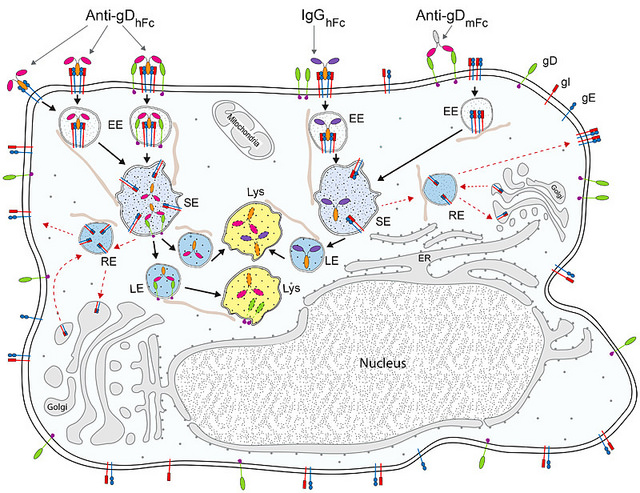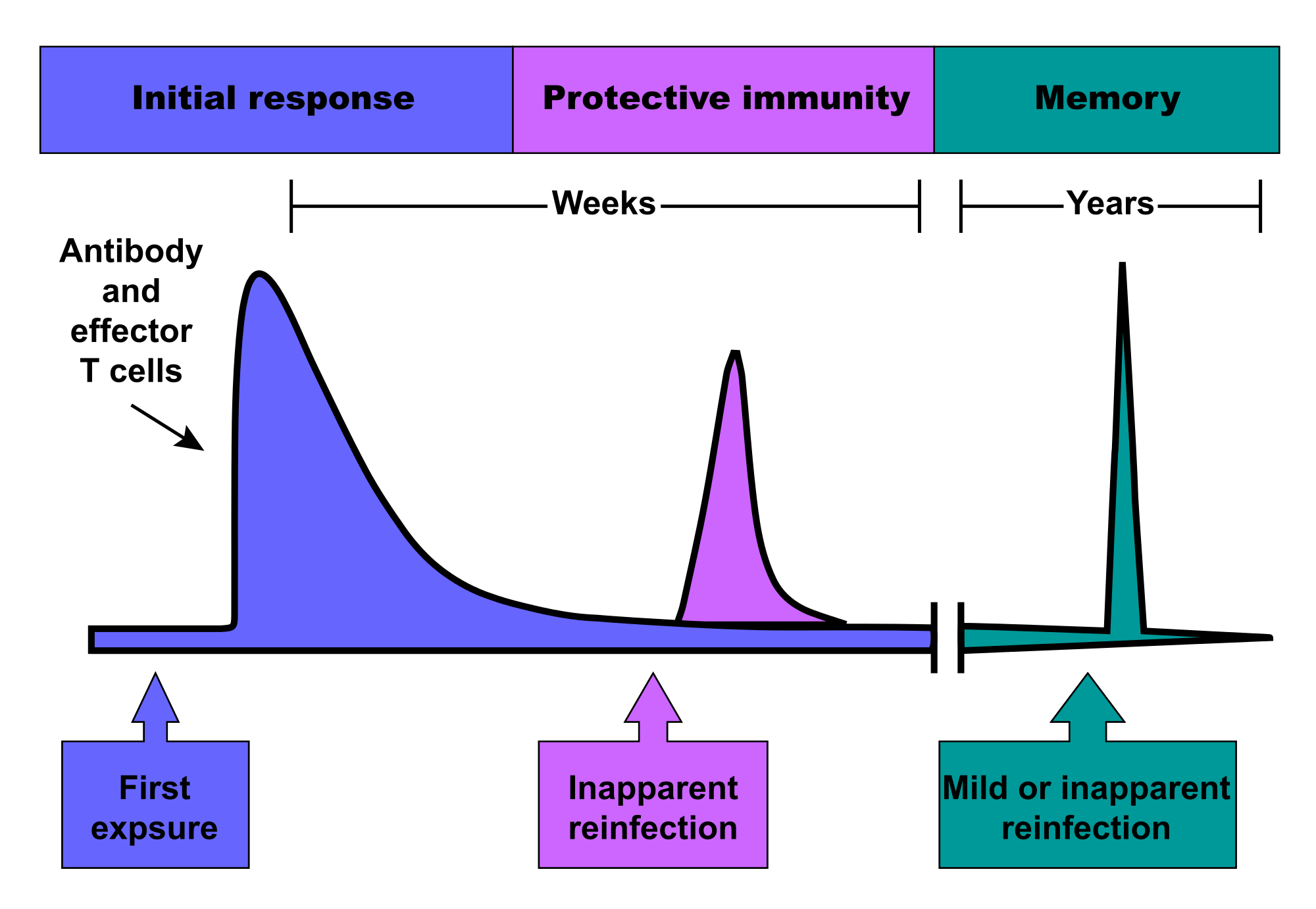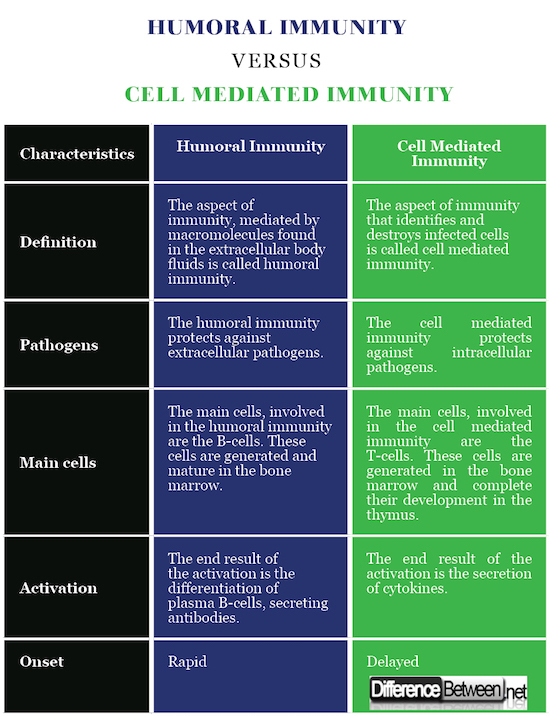Difference Between Humoral and Cell Mediated Immunity
The immune system has two divisions:
- Humoral Immunity – the aspect of immunity, mediated by macromolecules found in the extracellular body fluids.
- Cell Mediated Immunity – the aspect of immunity that identifies and destroys infected cells.
What is Humoral Immunity?
Part of the bacteria, causing infectious diseases, live and reproduce in the extracellular body space. Many intracellular pathogens spread through the extracellular body fluids. The extracellular body spaces are protected by the humoral immunity. Its protective function is found in the cell-free body fluid or serum, called humor.
The extracellular pathogens are destructed by antibodies, produced by the B-cells. The activation and differentiation of the B-cells into antibody-producing cells is provoked by the presence of an antigen. It often requires the participation of helper T-cells from TH1 or TH2 class.
Antibodies eliminate the pathogens by neutralization, or by facilitating the work of the phagocytic cells. The type of the effector mechanism that will be used depends on the type of the produced antibodies.
In order to enter the cells, viruses and bacteria bind to certain molecules, located on the cells’ surface. By binding with the pathogen the antibody obstructs this process and protects the cells. This type of elimination of the pathogens is called neutralization.
Antibodies facilitate the uptake of the bacteria by phagocytic cells. They bind to the antigen’s surface and help phagocytes recognize the pathogens. This process is called opsonization. By binding to the surface of a pathogen the antibodies can activate complement system’s proteins. The complement system is a group of plasma proteins which attack extracellular pathogens. It can activate spontaneously or by antibody, bind to a pathogen. The activation of these proteins enables them to bind to the pathogens’ surface. Thus they facilitate the work of phagocytes.
What is Cell Mediated Immunity?
Pathogen within a living cell is not recognized by the humoral immunity. For this reason the antibodies are not effective when the pathogens infect cells. The cell-mediated immune response is the one, able to identify and destroy infected cells. Thus, it prevents the further invasion of viruses or bacteria.
T-cells develop in the thymus. From there they enter the blood and circulate between the peripheral lymphoid tissue and the blood until they found their specific antigen.
The so called naive T-cells are mature recirculating cells that haven’t met their specific antigen. When such cell encounters an antigen it starts to multiply and differentiate into armed effector T-cells. These cells are able to contribute to the termination of the antigen. When they meet their antigen on other (target) cell they act rapidly.
The naive T-cells activate and form armed effector T-cells when they meet their antigen in the form of major histocompatibility complex (MHC) on the top of an activated antigen-presenting cell. Examples of antigen-presenting cells are the dendritic cells. They are highly specialized cells, ingesting antigen at sites of infection. They migrate to a local lymphoid tissue where they present the antigen to the recirculating T-cells. Macrophages and B-cells can act as antigen-presenting cells.
Effector T-cells recognize peptide antigens from different pathogens. MHC class I molecules carry to the cell surface the peptides from pathogens in the cells and present them to CD8 T-cells. These cells differentiate into cytotoxic T-cells which kill the infected cells. Pathogens proliferating in vesicles inside the cells, toxins, and peptide antigens from extracellular bacteria, are transported to the surface of the cell by МНC class II molecules. They present the pathogens to the СD4 Т-cells, which differentiate into TH1 and TH2. Pathogens accumulating inside dendritic cells and macrophage stimulate the production of TH1 cells. The extracellular antigens stimulate the differentiation of TH2 cells.
The infected cells are destroyed by cytotoxic T-cells, while the intracellular pathogens are terminated by macrophages.
After the termination of an infection the number of T-cells decreases but a small number is maintained for years. That’s why the re-infection with a microbe results in a more profound and rapid proliferation of effector T-cells and leads to vast clearance of the organism.
Difference Between Humoral and Cell Mediated Immunity
-
Definition of Humoral and Cell Mediated Immunity
Humoral Immunity: The aspect of immunity, mediated by macromolecules found in the extracellular body fluids is called humoral immunity.
Cell Mediated Immunity: The aspect of immunity that identifies and destroys infected cells is called cell mediated immunity.
-
Pathogens
Humoral Immunity: The humoral immunity protects against extracellular pathogens.
Cell Mediated Immunity: The cell mediated immunity protects against intracellular pathogens.
-
Main cells
Humoral Immunity: The main cells, involved in the humoral immunity are the B-cells. Thеse cells are generated and mature in the bone marrow.
Cell Mediated Immunity: The main cells, involved in the cell mediated immunity are the T-cells. Thеse cells are generated in the bone marrow and complete their development in the thymus.
-
Activation
Humoral Immunity: The end result of the activation is the differentiation of plasma B-cells, secreting antibodies.
Cell Mediated Immunity: The end result of the activation is the secretion of cytokines.
-
Onset
Humoral Immunity: The onset is rapid.
Cell Mediated Immunity: The onset is delayed.
Difference between Humoral and Cell Mediated Immunity in Tabular form
Summary of Humoral Vs. Cell Mediated Immunity
- The immune system has two divisions – humoral immunity and cell mediated immunity.
- The aspect of immunity, mediated by macromolecules found in the extracellular body fluids is called humoral immunity.
- The aspect of immunity that identifies and destroys infected cells is called cell mediated immunity.
- The humoral immunity protects against extracellular pathogens, while the cell mediated immunity protects against intracellular pathogens.
- The main cells, involved in the humoral immunity are the B-cells. These cells are generated and mature in the bone marrow.
- The main cells, involved in the cell mediated immunity are the T-cells. These cells are generated in the bone marrow and complete their development in the thymus.
- The end result of the activation is the differentiation of plasma B-cells, secreting antibodies. The end result of the activation is the secretion of cytokines.
- The humoral immunity has a rapid onset, while the cell mediated immunity has a delayed onset.
- Difference Between Gallstones and Cholecystitis - September 5, 2021
- Difference Between Constipation and Cramping - August 4, 2021
- Difference Between Whole Genome Sequencing and Microarray - May 6, 2021
Search DifferenceBetween.net :
1 Comment
Leave a Response
References :
[0]Image credit: https://upload.wikimedia.org/wikipedia/commons/thumb/2/26/Immune_response2.svg/2000px-Immune_response2.svg.png
[1]Image credit: https://www.flickr.com/photos/ajc1/13126463265
[2]Abbas, A., A.. Lichtman. Basic Immunology. 8th edition. Philadelphia: Elsevier Saunders. 2015. Print.
[3]Abbas, A., A.. Lichtman, Sh. Pillai. Cellular and Molecular Immunology. 3rd edition. Philadelphia: Elsevier Saunders. 2011. Print.
[4]Janeway, Ch., P. Travers, M. Walport, M. Shlomchik. Immunobiology, 5th edition. The Immune System in Health and Disease. New York: Garland Science. 2001. Print.




clear and useful, good luck